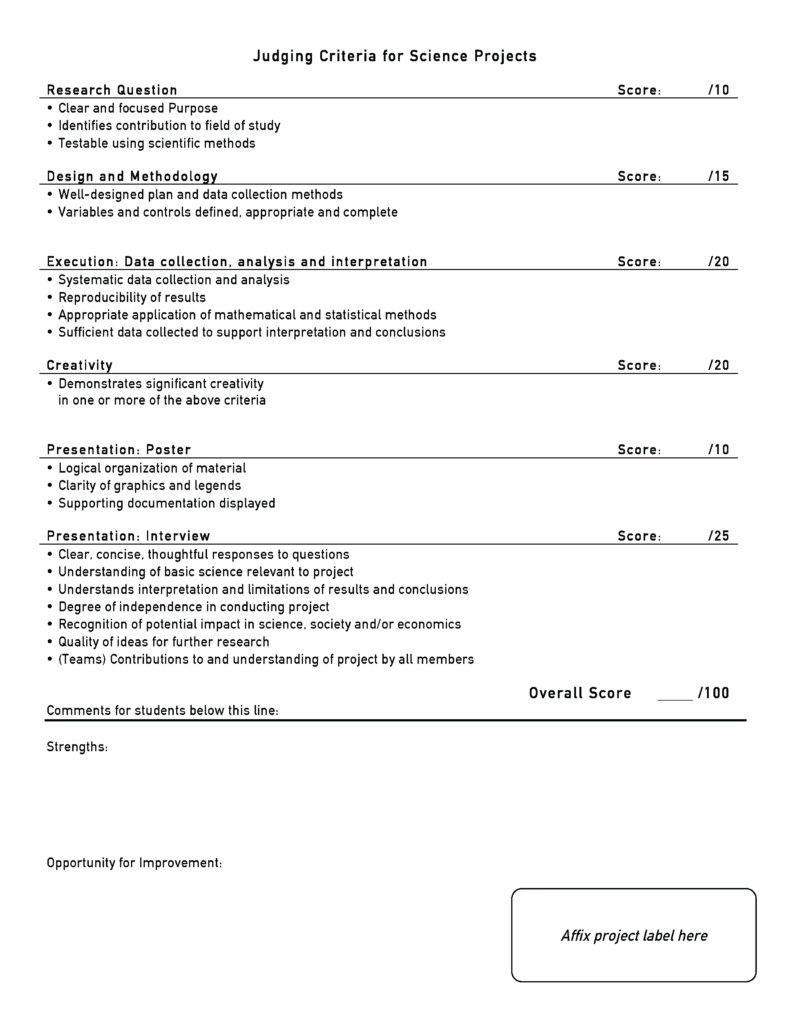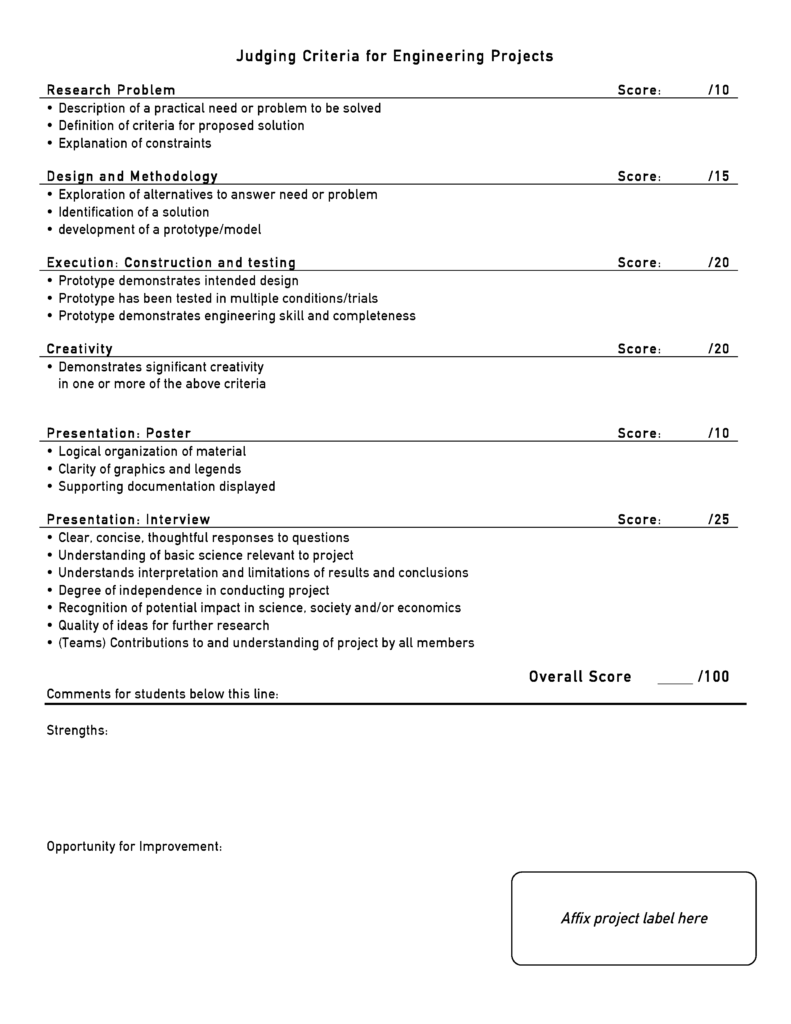Explore
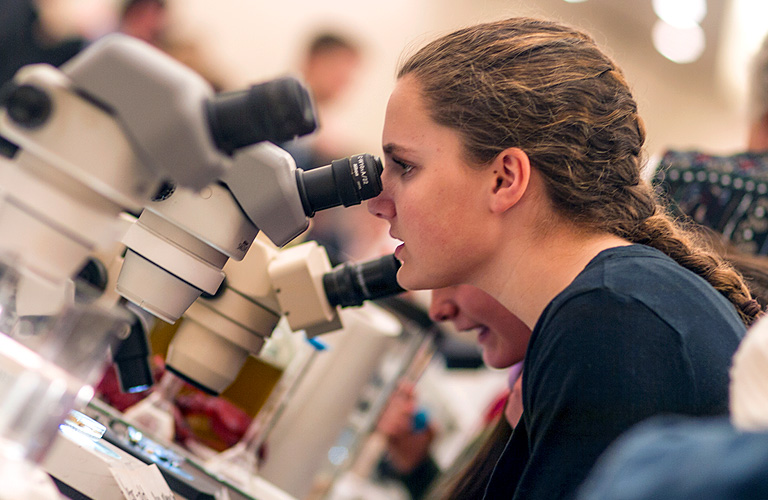
Do you ever find yourself thinking, “I wonder…” when you witness something in the world around you? Perhaps you’ve encountered a problem and you wish someone would come up with a solution. That person could be you! The key to your success and enjoyment with Maine State Science Fair is to follow your own creativity and passions to develop a project that is truly your own. This simple guide will give you an overview of the adventure that is the Science Fair.
DEVELOPING YOUR SCIENCE FAIR PROJECT
Anyone who has read a mystery novel or seen a “whodunit,” has seen the scientific method in action. It is a logical, organized mechanism for identifying and researching a problem and devising a strategy to solve it. Below left, you will find steps of the scientific method. Students conducting an engineering project should follow the engineering design process, below right.
Step 1: Sign up / Register
Students should register their project on LaunchPad, our web-based science fair project submission and review system. The registration deadline is MLK Day – January 20.
Step 2: Choose a topic
Your topic should be something that interests you and causes you to ask questions or stimulates your curiosity. Use science or engineering to solve a problem in your school or community. Ask questions about the topic. Do you know the answers? Does someone else know the answers? Investigate if other students have studied this topic.
Step 3: Conduct background research
What is already known about this topic? What questions are other people asking? What has yet to be discovered? Utilize background research resources in your school, library, online, or ask the experts. Document your findings in a literature review.
Scientific Research Projects
Step 4a: Ask the question
Boil your ideas down to a single research question or problem. Write a hypothesis or begin to sketch out a design solution.
Step 4b: Design an Experiment
Design an experiment whose results will either support or disprove your hypothesis.
Step 4c: Research Plan
After conducting your literature review, clearly describe your research plan that will allow you to answer your research question from 4a.
Engineering Design Projects
Step 4a: Specify Requirements
Brainstorm the objectives – the functionalities your solution should have – to address the problem. Identify constraints that may limit the possibilities of a solution.
Step 4b: Design & Build a Prototype
Envision a number of possible solutions and select one or more to serve as prototypes and build them.
Step 4c: Research Plan
After conducting your literature review, clearly describe your plan for testing your prototype(s) in relation to your objectives and constraints.
Step 5: Submit your project online
Submit the required forms in LaunchPad. If your project involves human participants, vertebrate animals, potentially hazardous biological agents or hazardous chemicals, activities, or devices, you must submit additional information and plans regarding research safety. For projects needing IRB/SRC approval, all forms must be submitted in LaunchPad by January 20.
Step 6: Review and Approval
If your project involves hazardous materials, hazardous biological agents, human subjects, or vertebrate animals it is subject to prior review by the Scientific Review Committee. You will be electronically notified that you may proceed. Projects NOT involving hazardous materials, hazardous biological agents, human subjects, or vertebrate animals may begin at any time — prior review by the Maine State Science Fair Scientific Review Committee is not required.
Institutional Review Board (IRB) Schedule
The MSSF IRB meets every two weeks from October through February. Please submit your project materials by the dates/times below in order to be considered for the next meeting.
- Friday, December 8 @ 12pm
- Friday, December 15 @ 12pm
- Friday, January 5 @ 12pm
- Friday, January 19 @ 12pm
- Friday, February 2 @ 12pm
Step 7: Experiment
Begin experimentation. Record all data in your Data Notebook. If you are testing a prototype, you should test, redesign, and test again as necessary.
Step 8: Abstract
Once you have completed your experiment and recorded all data, submit the abstract form online. Abstracts are due March 1.
Step 9: Create Your Display
Create a poster or tri-fold display describing your project. See Display Rules for what is fair game and what is not allowed.
Step 10: Compete!
Attend the Maine State Science Fair, present your project, ask great questions, and enjoy a day of discovery in STEM!
CATEGORIES
Many projects could easily fit into more than one category. It is your decision to choose the category that most accurately describes your project. Click on a category below to see its definition.
Study of animals and animal life, including the study of the structure, physiology, development, and classification of animals. Animal ecology, physiology, husbandry, cytology, histology, entomology, ichthyology, ornithology, herpetology, etc.
The science or study of the thought processes and behavior of humans and other animals in their interactions with the environment studied through observational and experimental methods. Includes clinical and developmental psychology, cognitive psychology, neuroscience, and sociology.
Includes basic (non-biomedical) research and engineering projects in cell physiology, immunology, genetics, molecular biology, neurobiology, and development.
This category includes research and engineering projects of relevance to human health. Projects include cell and organ physiology, molecular genetics of disease, immunology, nutrition, biomedical devices, imaging, and cell and tissue engineering.
The science of the composition, structure, properties, and reactions of matter, especially of atomic and molecular systems. Includes analytical chemistry, environmental chemistry, inorganic and organic chemistry, and materials chemistry including polymers, biomaterials, composites, and nanomaterials.
The study of information processes, the structures and procedures that represent processes, and their implementation in information processing systems. It includes systems analysis and design, application and system software design, programming, and datacenter operations. Includes computational biology, bioinformatics, algorithms, databases, operating systems, AI and machine learning, robotics.
The study of renewable energy sources, energy efficiency, clean transport, and alternative fuels.
Includes aeronautical engineering, civil engineering, mechanical engineering, vehicle and naval systems.
The analysis of existing conditions of the environment. The study of managing human interaction with the environment. Includes environmental engineering, atmospheric and climate science, environmental effects on ecosystems, geosciences, and water science.
The study of the measurement, properties, and relationships of quantities and sets, using numbers and symbols. The deductive study of numbers, geometry, and various abstract constructs, or structures. Mathematics is very broadly divided into foundations, algebra, analysis, geometry, and applied mathematics, which includes theoretical computer science. Includes algebra, analysis, combinatorics, geometry, number theory, probability and statistics.
The study of microorganisms, including bacteria, viruses, prokaryotes, and simple eukaryotes and of antibiotic substances. Includes antimicrobials, bacteriology, environmental microbiology, microbial genetics, and virology.
Includes the science of matter and energy and the study of anything beyond Earth. Projects include magnetics, optics, lasers, quantum computation, theoretical physics, biological physics, computational physics, and astronomy.
Study of plant life. Plant ecology, agronomy, horticulture, forestry, plant taxonomy, physiology, pathology, plant genetics, hydroponics, algae, etc.
If your project does not fit into any of the categories listed above, please contact sciencefair@jax.org for guidance. Please note that the MSSF team may move a project to a different category if there is a better fit.
IDEAS OF THE WEEK
Need some inspiration? The MSSF Team put their heads together and came up with some great starting points for projects. Do any of them spark your interest? We’re excited to see where you take these ideas!
This idea was suggested by the Maine Aquaculture Association:
This idea was suggested by The Algae Foundation:
COVID POLICY
- The event is closed to spectators beyond chaperones accompanying bussed students and parents who are driving their teens to the event because their school does not provide a bus.
- Everyone in attendance will remain masked for the duration of the event while in the Field House, including any aforementioned parents or chaperones.
- Any student who meets the CDC Guidelines for Quarantine or Isolation must participate virtually.
- Students can also switch to virtual participation for any reason, but they cannot switch from virtual to in-person.
- On a related note, Colby College does not allow any food or drinks, except for water, in the Field House. We will send students home with boxed lunches at noon.
INSTITUTIONAL REVIEW BOARD (IRB)
The IRB reviews all projects involving human participants. These projects must receive approval before the student researchers begin experimentation or prototype testing. The IRB meets approximately every two weeks, as shown here. Students wishing to have their project reviewed by the IRB must have all forms submitted with teacher approval in LaunchPad by noon on the deadline listed for that meeting.
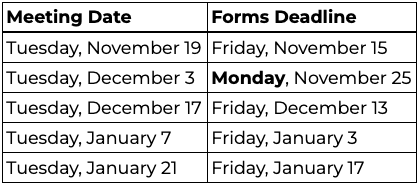
RULES
The following Rules and Guidelines are based on the International Rules and Guidelines for Science Fairs, Society for Science & the Public.
The purpose of these rules is to:
- protect the rights and welfare of the student researcher
- protect the rights and welfare of the human participant
- protect the health and welfare of the vertebrate animal subject
- ensure adherence to federal regulations
- ensure use of safe laboratory practices
- protect the environment
- ensure eligibility for competition in the Intel International Science and Engineering Fair
Ethics Statement
Scientific fraud and misconduct are not condoned at any level of research or competition. This includes plagiarism, forgery, use or presentation of the researcher’s work as one’s own, and fabrication of data. Fraudulent projects will fail to qualify for competition. The Maine State Science Fair reserves the right to revoke recognition of a project subsequently found to have been fraudulent.
Eligibility/Limitations
- Maine State Science Fair is open to all 9th-12th grade students who attend a school in Maine or are homeschooled in Maine.
- A student must not have reached age 20 on or before May 1 immediately following the fair.
- Each student may enter only one project. That project may include no more than 12 months of continuous research and may not include research performed before January of the previous calendar year.
- Team projects may have up to three members if they wish to be considered for awards or prizes. Teams may not substitute members in a given research year.
- A research project may be apart of a larger study performed by professional scientists, but the project presented by the student must be only their own portion of the complete study.
All Projects
- All projects must adhere to the ethics statement above.
- All projects must adhere to local, state and U.S. Federal laws, regulations and permitting conditions.
- It is the responsibility of the student(s) and the Adult Sponsor to evaluate the study to determine if the research will require forms and/or review and approval prior to experimentation.
- The use of non-animal research methods and the use of alternatives to animal research are strongly encouraged and must be explored before conducting a vertebrate animal project.
- Introduction or disposal of non-native, genetically altered, and/or invasive species (e.g. insects, plants, invertebrates, vertebrates), pathogens, toxic chemicals or foreign substances into the environment is prohibited.
- Exhibits must adhere to the MSSF Display and Safety Requirements.
Approval and Documentation
- Project documentation should begin in LaunchPad before experimentation begins unless the student has received written permission from the MSSF team. Projects involving human participants, vertebrate animals, and potentially hazardous biological agents are subject to prior review and approval by the Maine State Science Fair Institutional Review Board (IRB) and/or Scientific Review Committee (SRC) prior to experimentation.
- Each project must name an Adult Sponsor (typically a classroom teacher or another adult research mentor), who must sign off on the project in LaunchPad.
- A Qualified Scientist is required for all studies involving BioSafety Level-2 (BSL-2) potentially infectious or hazardous biological agents and DEA- controlled substances, and is also required for many human participant studies and many vertebrate animal studies.
- After initial IRB/SRC approval (if required), any proposed changes in Research Plan must be re-approved before laboratory experimentation/data collection resumes.
- Projects which are continuations of a previous year’s work and which require IRB/SRC approval must undergo the review process with the current year proposal prior to experimentation/data collection for the current year.
- Any continuing project must document that the additional research is new and different.
- If work was conducted in a Regulated Research Institution (such as a university or laboratory), industrial setting or any worksite other than home, school or field at any time during the current MSSF project year, then a representative of the Regulated Research Institution must also sign off on the project.
- After experimentation, each student or team must submit a 250-word (maximum) abstract, which summarizes the current year’s work. The abstract must describe research conducted by the student, not by the supervising adult(s).
Topic-Specific Rules and Guidelines
- Human Participants
- Vertebrate Animals
- Potentially Hazardous Biological Agents
- Hazardous Chemicals, Activities or Devices
MSSF Display and Safety Rules
- Only freestanding tabletop displays are allowed. MSSF will not provide tripods or other poster holders at the fair venue.
- Size Limitations – 30 in (76 cm) deep, 48 in (122 cm) wide, 78 in (198 cm) high from tabletop.
- Equipment and electricity at the table- No equipment other than what is an integral part of home-built apparatus will be allowed in the display during judging. No electric power will be available during judging. Laptops may be used to demonstrate software local to the machine.
- The participant’s name, school, and town may be displayed on the poster.
- Acknowledgements on the project display are no longer prohibited; in alignment with the MSSF ethics statement, students may recognize those that have supported their work in an acknowledgements section on their poster.
Not Allowed At Project
- Student’s postal address, email address, phone/fax number, website, or social media handles
- Web addresses, QR codes, or other mechanisms for connecting to websites
- Living organisms including plants, animals, and microbes
- Taxidermy specimens or parts
- Preserved vertebrate or invertebrate animals
- Human or animal food
- Human/animal parts or body fluids (for example, blood, urine)
- Plant materials (living, dead, or preserved) which are in their raw, unprocessed, or non-manufactured state
- Laboratory/household chemicals including water (Exceptions: water integral to an enclosed apparatus; crystals grown by you, displayed in a case, and removed after final judging)
- Poisons, drugs, controlled substances, hazardous substances or devices (for example, firearms, weapons, ammunition, reloading devices)
- Dry ice or other sublimating solids
- Sharp items (for example, syringes, needles, pipettes, or knives)
- Flames or highly flammable materials
- Batteries with open-top cells
- Awards, medals, business cards, flags, endorsements, and/or acknowledgements (graphic or written) unless the item(s) are an integral part of the project
- Photographs or other visual presentations depicting vertebrate animals in surgical techniques, dissections, necropsies, or other lab procedures
- Active Internet or e-mail connections as part of displaying or operating the project at the MSSF.
- Overlapping panels on the backboard are not permitted. Supporting detailed information should be contained in a data book.
- Glass or glass objects unless deemed by the Maine State Science Fair to be an integral and necessary part of the project.
- Any apparatus deemed unsafe by the Maine State Science Fair (for example, large vacuum tubes or dangerous ray-generating devices, empty tanks that previously contained combustible liquids or gases, pressurized tanks, etc.)
Allowed at Project BUT with the Restrictions Indicated
- Soil or waste samples if permanently encased in a slab of acrylic.
- Photographs and/or visual depictions if sources are credited. For example: “Photographs taken by finalist.” Photographs of participants are allowed, provided participants are not identified by name.
- Any apparatus with unshielded belts, pulleys, chains, or moving parts with tension or pinch points may not be operated.
- Class II lasers (Class III and IV lasers may not be operated):
- May be operated only by the fair participant
- May be operated only during finalist judging
- Sign must be posted that reads: “Laser Radiation: Do Not Stare into Beam.”
- Must have protective housing that prevents physical and visual access to beam
- Must be disconnected when not operating
- Any apparatus producing temperatures that will cause physical burns must be adequately insulated.
- Electrical Regulations:
- Bare wire and exposed knife switches may be used only in circuits of 12 volts or less.
- All electrical connectors, wiring, switches, extension cords, fuses, etc. in high voltage circuits (over 12 volts) must be UL-listed and must be appropriate for the load and equipment. Connections must be soldered or made with UL-listed connectors. Wiring, switches, and metal parts must have adequate insulation and over current safety devices (such as fuses) and must be inaccessible to anyone but the fair participant. Exposed electrical equipment or metal that is liable to be energized must be grounded or shielded with a grounded metal box or cage to prevent accidental contact.
- There must be an accessible, clearly visible on/off switch or other means of disconnect from the power source. Maximums are 500 watts @ 130 volts AC / 60 Hertz.
- Finalists requiring 120 volt AC electrical power must provide a UL-listed 3-wire extension cord which is appropriate for the load and equipment.
